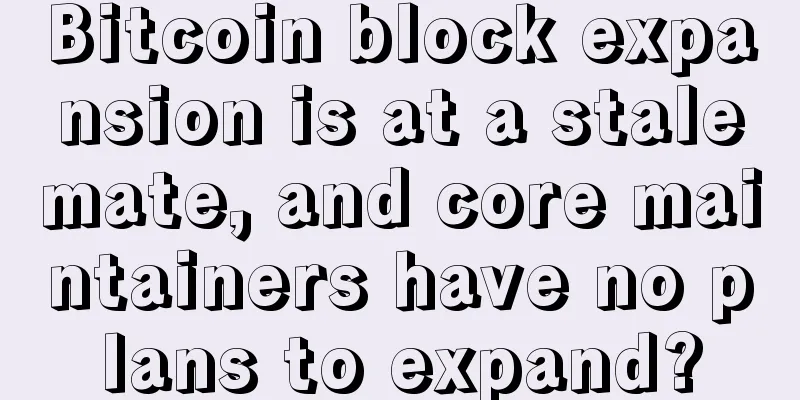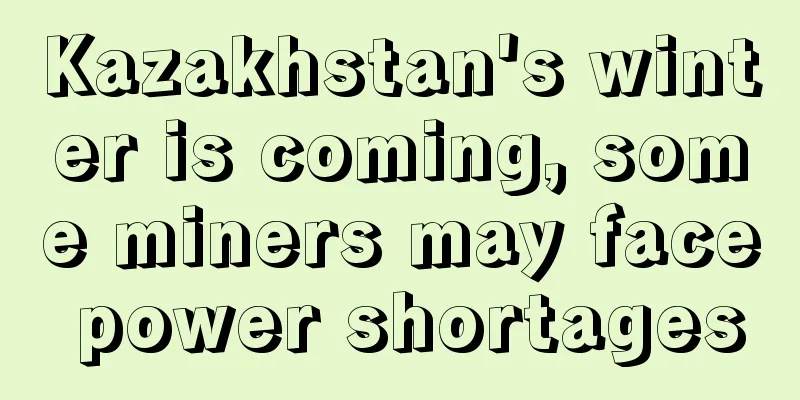Bitcoin block expansion is at a stalemate, and core maintainers have no plans to expand?

|
The issue of Bitcoin block expansion is currently at a stalemate, with no progress and no future progress. No matter how many people in the Bitcoin community demand an increase in block capacity, the Bitcoin core maintainers have no plans to expand the capacity at all, which is completely different from what people in the Bitcoin community imagine. In this post, I want to talk about the current status of Bitcoin Improvement Proposal 100, why Bitcoin Core maintainers will not raise the block size limit, the recent admission by Bitcoin Core maintainers that they do not actually make decisions by consensus, some of the lowdown on recent DoS attacks, and why this December’s workshop will not change the status quo. BIP 100 BIP100 is a proposal that is supported by about
Core staff opposes decision-making based on miners’ votingAt the Bitcoin Scaling Workshop in Montreal, discussions about specific plans for block size expansion were banned, although people still had some "illegal" discussions in the hallways that were not officially allowed. According to the meeting summary report, the meeting produced almost no agreement. But there was one thing that everyone clearly agreed on:
Translated into language that everyone can understand, unlike BP100 or BP101, there will no longer be a miner voting process, and even the decision to start a hard fork will not take into account whether the miners are ready. Miners can only express their opinions and suggestions, and Bitcoin Core maintainers can listen to the opinions of miners or not. Regardless of whether enough miners are ready for the necessary software upgrades and whether they have the support of any members of the community, these core maintainers can choose a date to fork. Because the democratic voting of miners is cancelled, Bitcoin Core maintainers can create a method (not yet determined, but presumably centralized) to cancel the fork. Incredibly, after criticizing Gavin Andresen and I for proposing a change that would only require 75% of miners to vote in favor, the few core developers themselves agreed in the meeting that the miners’ views were completely irrelevant when it came to block size increases. But it doesn’t matter. Here’s why: Core staff will not raise the block size limitPeople in the Bitcoin community generally believe that all Bitcoin developers want to increase the block size, but it will take some time to come up with a solution that everyone agrees is the best. These beliefs may come from what Bitcoin developers have been saying all along. These beliefs are completely wrong. Only five people in the world can modify the Bitcoin Core source code: • Gavin Andresen Three of them (Gavin, Jeff, and Peter) would not make changes that would displease the other two, which meant that it was actually just two people, Wladimir Van der Laan and Gregory Maxwell, who controlled the core source code repository. Wladimir Van der Laan expressed his disapproval of increasing the block size early on, posting his thoughts after months of debate on the block size issue:
Remember, Core Group members have controls that miners don’t have, so this is coming from a person who runs Bitcoin. And he believes that technology won’t continue to advance because banks gave American homeowners a lot of subprime loans in 2008. This is absolutely ridiculous: computer speed has nothing to do with subprime lending, and the financial crisis was not caused by exponential growth. So if you’re waiting for the core group to agree to a block size increase, remember this: no code will be included in Bitcoin Core unless Wladimir agrees, and he believes that any block size changes cannot happen “in the near future.” So what does Maxwell think about increasing the block size? He often contradicts himself; claiming that he wants to increase the block size, but at the same time saying that expansion should not happen. So far, Maxwell has not explicitly supported any expansion proposal. Judge a man by what he does, not what he says: When Gavin and I asked Maxwell to come up with a specific expansion proposal, his response was Lightning Network (and block size permanently stopped at 1mb). I don't think the Bitcoin Core team will allow the Blockchain to have a future. Not now, not in December, and not ever. The two people who have the power to decide what goes into the Bitcoin Core source code will not allow it. Conflict of InterestMany of the Bitcoin Core developers are employed by a company called Blockstream, which recently launched a commercial sidechain product called Liquid, which is primarily used to connect Bitcoin exchanges, with customers paying the company a monthly fee. This is a cause for concern, because it means that those trusted by the Bitcoin community to maintain and bootstrap the blockchain have a strong incentive to keep it working poorly and never improve. No wonder Blockstream’s official position is that the blockchain should remain largely unchanged, even with simple and obvious improvements like increasing the block size not being made. Below is a list of Bitcoin Core developers who have been employed by Blockstream: Pieter Wiulle (has access to the Bitcoin Core codebase) Developers making decisions by consensus is a liePerhaps despite this, readers still believe that these core developers will take action on suggestions that everyone can reach consensus on, and they just won’t adopt controversial ideas. I’m sure you have seen these statements many times. The fact is not like this. It's not that everyone agrees, but as long as those who have access to the Bitcoin core code base decide to change it, the core version will be changed... Maxwell recently admitted in a debate that a change he wanted to make to the Bitcoin protocol rules was something that many people disagreed with.
What is the truth: In May of this year, Gregory Maxwell himself said in an email to Matt Corallo (another Blockstream employee) that “the hard fork must be conducted after everyone is almost completely free of controversy.” Matt’s email said: “In a technical community like Bitcoin, consensus is the most basic requirement for any major decision such as block size increase.” In May, Pieter Wiulle (another of the five people who can modify the Bitcoin Core code) said: "I don't think we can do a contentious hard fork." In August he said again: "The consensus provisions of Bitcoin refer to a system where decisions are made by consensus, not a democracy where the majority decides. You need to find a solution that everyone agrees on, or don't do it." Adam Back, president of Blockstream and owner of Maxwell, told IEEE Spectrum magazine, “Everyone needs to be on the same page and do it in a coordinated way.”
So, the statement that Bitcoin Core maintainers require consensus to modify the code did not originate from me, but from the guys in charge of the Bitcoin project themselves. So why did Gregory Maxwell suddenly do a 180-degree turn? It's simple: a change he wants to make has suddenly become controversial, and others disagree with his idea, so he wants to abolish the rule that requires consensus to make changes. What better way to do that than to claim that the rule never existed in the first place? Why December won't bring any changesWhen talking to Bitcoin miners and companies, I have heard more than once: “We are waiting for the second meeting on block size increase in December. If there is no progress by then, we will switch to BIP 101”. It seems that too many people in the community believe that we will have a solution by the December meeting. At the first meeting, Gavin made a clear promise that progress would be made: “I gave Gregory/Pieter/Wladimir a few weeks to do what they said they were going to do in Montreal, which was to come up with a plan that everyone could live with, even if it wasn’t satisfactory.” If you still don't believe this, consider that it's been a month since the Montreal meeting and nothing has happened: the topic hasn't even been mentioned in their weekly meetings. There are only six weeks until the Hong Kong meeting, and even if it starts tomorrow, they only have six weeks to deliver on their promise and find a solution that "everyone can live with." It was a bold prediction: they would not honor their promise to Gavin and would go to the meeting empty-handed. People keep asking me if I plan to go to the Hong Kong meeting, I don’t, and neither will Gavin. If it takes two meetings and 10 months for the Bitcoin Core and Blockstream guys to decide how to change a single number, that’s their problem: Gavin, I, and others did the talking, the decision, the testing, the review, and delivered a working version months ago. in conclusionI understand that people in the Bitcoin community are afraid of arguments and conflicts. Miners who have invested a lot of money are worried that a controversial change will cause the price of Bitcoin to drop, causing them to lose money. But every Bitcoin user, miner, and investor faces a stark choice:
Decentralization is not some vaguely defined set of development process specifications that can be ignored if it goes against Blockstream’s interests. It is the ability of people to choose a version of the software that aligns with their beliefs after being given all the information they need, and it always has been. ---- Original article: https://medium.com/@octskyward/%E6%AF%94%E7%89%B9%E5%B8%81%E5%8C%BA%E5%9D%97%E5%A4%A7%E5%B0%8F%E7%9A%84%E9%97%AE%E9%A2%98-a4a25d30485f |
<<: Will Bitcoin Become the Sixth Global Reserve Currency by 2030?
>>: USAA to Provide Bitcoin Balance Checking Service for Coinbase Users
Recommend
Antminer T17 is launched with the second-generation 7nm chip to achieve maximum economic optimization of the whole machine
On April 28, Bitmain, one of the world's top ...
Cross pattern in palmistry
Palmistry contains all kinds of information. If y...
Nigerian Securities and Exchange Commission warns of pyramid schemes such as OneCoin, Bitcoin is innocently caught in the crossfire
This past week, the Nigerian Securities and Excha...
Which comes first, starting a family or establishing a career?
Which comes first, starting a family or establish...
What is the fate of people with double chins?
Chin Physiognomy: What is the fate of people with...
Check out the body shape suitable for early marriage
When it comes to early marriage, we must understa...
Coin Zone Trends: Bitcoin Price Trends Based on Big Data This Week (2016-11-29)
Sideways instead of falling midline slightly bull...
Brown-eyed people's personality and business strategies
People with brown eyes are humorous, cheerful, li...
What does a mole on a man’s forehead represent?
Moles in different positions on the face will hav...
What does it look like to be destined to be lonely forever?
Everyone hopes to have a sweet love and a partner...
In fact, Bitcoin mining has experienced its toughest year in 10 years
Bitcoin miners have been on a tear in 2019, pushi...
What is the fate line?
We have many lines on our hands, including career...
As Bitcoin plummets, why are more countries joining the "big gamble"?
El Salvador's big bet on Bitcoin reflects the...
Will Bitcoin halving bring about a bull market? Wu Jihan vs. Jiang Zhuoer
The New Year has just arrived, but the new corona...
Rare and extremely wealthy moles on women
Rare and extremely wealthy moles on women Mole on...









